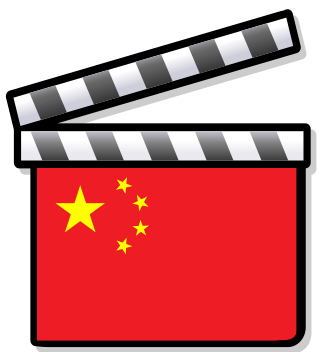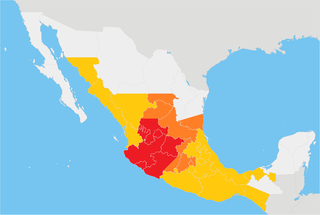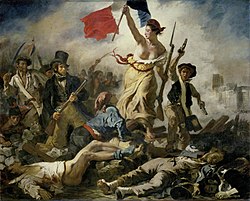
The cinema of China is the filmmaking and film industry of the Chinese mainland under the People's Republic of China, one of three distinct historical threads of Chinese-language cinema together with the cinema of Hong Kong and the cinema of Taiwan.

A propaganda film is a film that involves some form of propaganda. Propaganda films spread and promote certain ideas that are usually religious, political, or cultural in nature. A propaganda film is made with the intent that the viewer will adopt the position promoted by the propagator and eventually take action towards making those ideas widely accepted. Propaganda films are popular mediums of propaganda due to their ability to easily reach a large audience in a short amount of time. They are also able to come in a variety of film types such as documentary, non-fiction, and newsreel, making it even easier to provide subjective content that may be deliberately misleading.

War film is a film genre concerned with warfare, typically about naval, air, or land battles, with combat scenes central to the drama. It has been strongly associated with the 20th century. The fateful nature of battle scenes means that war films often end with them. Themes explored include combat, survival and escape, camaraderie between soldiers, sacrifice, the futility and inhumanity of battle, the effects of war on society, and the moral and human issues raised by war. War films are often categorized by their milieu, such as the Korean War; the most popular subjects are the Second World War and the American Civil War. The stories told may be fiction, historical drama, or biographical. Critics have noted similarities between the Western and the war film.

Socialist realism was the official cultural doctrine of the Soviet Union that mandated an idealized representation of life under socialism in literature and the visual arts. The doctrine was first proclaimed by the First Congress of Soviet Writers in 1934 as approved method for Soviet cultural production in all media. Following World War II, socialist realism was adopted by countries politically aligned with the Soviet Union. The primary official objective of socialist realism was "to depict reality in its revolutionary development" although no formal guidelines concerning style or subject matter were provided.

In Marxist philosophy, cultural hegemony is the dominance of a culturally diverse society by the ruling class who shape the culture of that society—the beliefs and explanations, perceptions, values, and mores—so that the worldview of the ruling class becomes the accepted cultural norm. As the universal dominant ideology, the ruling-class worldview misrepresents the social, political, and economic status quo as natural, inevitable, and perpetual social conditions that benefit every social class, rather than as artificial social constructs that benefit only the ruling class.

The Cristero War, also known as the Cristero Rebellion or La Cristiada, was a widespread struggle in central and western Mexico from 3 August 1926 to 21 June 1929 in response to the implementation of secularist and anticlerical articles of the 1917 Constitution. The rebellion was instigated as a response to an executive decree by Mexican President Plutarco Elías Calles to strictly enforce Article 130 of the Constitution, a decision known as the Calles Law. Calles sought to limit the power of the Catholic Church in Mexico, its affiliated organizations and to suppress popular religiosity.
A timeline of China's media-related history, including computer hardware, software development, the history of the Internet, etc.

Cinema of Europe refers to the film industries and films produced in the continent of Europe.

Extreme cinema is a subgenre used for films distinguished by its use of excessive sex and violence, and depiction of extreme acts such as mutilation and torture. It recently specializes in genre film, mostly both horror and drama.

Tomás Garrido Canabal was a Mexican politician, revolutionary and atheist activist. Garrido Canabal served governor of the state of Tabasco from 1920 to 1924 and from 1931 to 1934. He was noted for his anti-Catholicism, during his term he led persecutions against the Church in his state, killing many priests and laymen and driving the remainder underground.
New Extreme Films describes a range of transgressive films made at the turn of the 21st century that sparked controversy, and provoked significant debate and discussion. They were notable for including graphic images of violence, especially sexual violence and rape, as well as explicit sexual imagery.

Mexican muralism refers to the art project initially funded by the Mexican government in the immediate wake of the Mexican Revolution (1910-1920) to depict visions of Mexico's past, present, and future, transforming the walls of many public buildings into didactic scenes designed to reshape Mexicans' understanding of the nation's history. The murals, large artworks painted onto the walls themselves had social, political, and historical messages. Beginning in the 1920s, the muralist project was headed by a group of artists known as "The Big Three" or "The Three Greats". This group was composed of Diego Rivera, José Clemente Orozco and David Alfaro Siqueiros. Although not as prominent as the Big Three, women also created murals in Mexico. From the 1920s to the 1970s, murals with nationalistic, social and political messages were created in many public settings such as chapels, schools, government buildings, and much more. The popularity of the Mexican muralist project started a tradition which continues to this day in Mexico; a tradition that has had a significant impact in other parts of the Americas, including the United States, where it served as inspiration for the Chicano art movement.

Carlos Obregón Santacilia (1896–1961) was a Mexican art déco architect. He trained at the Academy of San Carlos during the Mexican Revolution. He claimed a distinguished Mexican heritage, as great grandson of Benito Juárez and grand nephew of Alvaro Obregón.
Cinema of Algeria refers to the film industry based in the north African country of Algeria.

The Unforgettable Year 1919 is a 1951 Soviet historical drama film directed by Mikheil Chiaureli.
Finlandia is a 1922 Finnish documentary and propaganda film.












